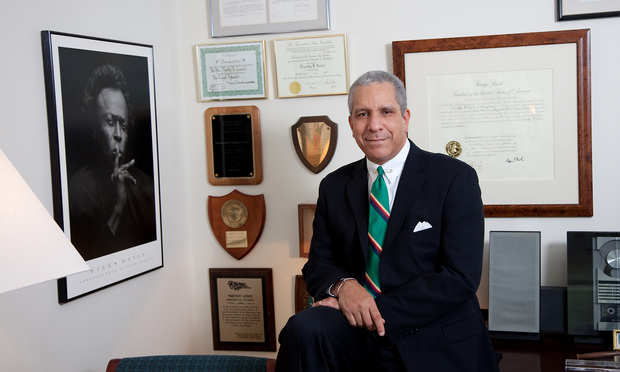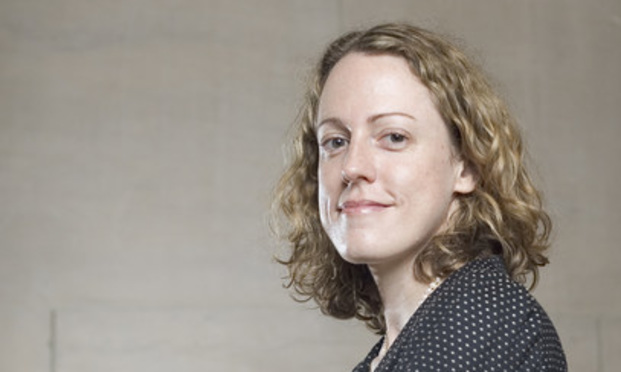'Appellate Project' Aims to Boost Diversity in Specialized Bar
The Appellate Project is developing ways to interest minority law students in appellate work at an early stage. The group is working through educational outreach and an "incubator" summer fellowship program.
June 24, 2020 at 05:02 PM
5 minute read
 Former Judge Timothy Lewis, now at Schnader Harrison. Courtesy photo.
Former Judge Timothy Lewis, now at Schnader Harrison. Courtesy photo.
During his time as a federal trial and appellate judge in Pennsylvania from 1991 to 1999, Timothy Lewis says, "I could count on half of one hand how many Black lawyers argued before me."
When Lewis went to private practice, he often served as a moot court judge for appellate practitioners and did not need a hand to count. "I never mooted a Black lawyer," he said in an interview Tuesday.
And that is why Lewis, who is African American, jumped at the opportunity to join the advisory board of The Appellate Project, a new effort to increase diversity in the prestigious but largely male and white-dominated niche practice of appellate law.
"There is systemic racism in the legal profession, with law firms and clients," Lewis said. "I've given too many speeches for too many years about this. We've made glacial progress." With the current wave of discussion about racial inequality nationwide, Lewis said, "we really have a chance here" to remedy the problem.
Lewis was recruited by Juvaria Khan, a civil rights lawyer who left her appellate career to launch the project. In 10 years as a litigator, she saw few minority lawyers in the appellate space. To shape the project, she sought out lawyers of color and also white lawyers to find out what could be done.
As a result, Khan decided to start early at the law-student level to generate interest in appellate work, an area that first-generation law students often know little about. "People of color remain greatly underrepresented as both appellate attorneys and judges," the project states on its website. "Over 30% of students enrolling in law school are students of color, yet very few end up in appellate practice. Too often, these students lack the information, resources and confidence they need to pursue appellate work."
Khan recalls her own experience at Columbia Law School. "It was a huge cultural shift for me. Many of my classmates had family members or friends who were lawyers or judges, and they just seemed to know how to navigate these spaces," she said.
She added, "It just often felt like everyone was speaking a different language. I got good grades, but I never even considered applying for clerkships." It was only after she went into private practice that "someone sat me down and explained to me the value of a clerkship and the currency it has in this profession."
Without that advice, Khan said, she probably would not have pursued appellate work. Statistics indicate that very few students of color pursue clerkships, often the first step toward an appellate career.
Like Lewis, Khan sees systemic racism as a cause for the lack of appellate diversity.
"The top of the appellate fields, much like the top of almost all other industries … are overwhelmingly white," Khan said. She added, "I think it's critical for both clients and employers to examine their assumptions about which attorneys are most 'qualified' to handle appellate cases when the opportunity arises. That means taking proactive steps internally to distribute appellate cases more equitably, and sharing argument opportunities with attorneys of color."
The project is developing programs to interest minority law students in appellate work at an early stage, through educational outreach, partnering with a Howard University School of Law civil rights appellate clinic and an "incubator" summer fellowship program that will connect students to appellate practitioners and judges as mentors.
 Sarah Harrington of Goldstein & Russell. Photo: Diego M. Radzinschi
Sarah Harrington of Goldstein & Russell. Photo: Diego M. Radzinschi"By expanding access to information, appellate-specific training and networking opportunities, The Appellate Project hopes to help law firms fulfill their expressed commitments to expanding diversity in their workplaces," said Sarah Harrington, partner at Goldstein & Russell and a member of the project's board of directors. "I believe that the highest courts in our country should hear from a diverse range of voices."
The project's board of directors, in addition to Khan and Harrington, includes Amir Ali, deputy director, Supreme Court and appellate counsel program at MacArthur Justice Center; Heather Kendall Miller of the Native American Rights Fund; and Tiffany R. Wright, senior associate at Orrick Herrington & Sutcliffe.
Its advisory board comprises Lewis, now counsel at Schnader Harrison Segal & Lewis; former U.S. Solicitor General Donald Verrilli Jr., now a partner at Munger, Tolles & Olson; Roy Englert Jr. partner at Robbins, Russell, Englert, Orseck, Untereiner & Sauber; and Sasha Samberg-Champion, counsel at Relman Colfax.
"My friend Juvaria Khan has a well-thought-through, concrete plan for improving diversity in the appellate bar by starting very early in prospective lawyers' studies and making them aware of opportunities and challenges alike," Englert said.
Read more:
D.C.'s Attorney General on Big Law and Building Coalitions
Tobi Young, First Native American SCOTUS Clerk, Recounts Year With Gorsuch
'Very Little Sleep': Katyal on Juggling Arguments, a Book, TV and '100%' Diversity
A New Push to Solve the Mystery of Low Numbers of Minority Law Clerks
This content has been archived. It is available through our partners, LexisNexis® and Bloomberg Law.
To view this content, please continue to their sites.
Not a Lexis Subscriber?
Subscribe Now
Not a Bloomberg Law Subscriber?
Subscribe Now
NOT FOR REPRINT
© 2025 ALM Global, LLC, All Rights Reserved. Request academic re-use from www.copyright.com. All other uses, submit a request to [email protected]. For more information visit Asset & Logo Licensing.
You Might Like
View All
Deluge of Trump-Leery Government Lawyers Join Job Market, Setting Up Free-for-All for Law Firm, In-House Openings
4 minute read
'As I've Grown Older': John Morgan Looks Back at a Life in Law

The 'Biden Effect' on Senior Attorneys: Should I Stay or Should I Go?
9 minute read
2024 GC Pay Report: Signing Bonuses Swell in Size as Companies Shy Away From Internal Hires
7 minute readLaw Firms Mentioned
Trending Stories
- 1The Rise and Risks of Merchant Cash Advance Debt Relief Companies
- 2Ill. Class Action Claims Cannabis Companies Sell Products with Excessive THC Content
- 3Suboxone MDL Mostly Survives Initial Preemption Challenge
- 4Paul Hastings Hires Music Industry Practice Chair From Willkie in Los Angeles
- 5Global Software Firm Trying to Jump-Start Growth Hands CLO Post to 3-Time Legal Chief
Who Got The Work
J. Brugh Lower of Gibbons has entered an appearance for industrial equipment supplier Devco Corporation in a pending trademark infringement lawsuit. The suit, accusing the defendant of selling knock-off Graco products, was filed Dec. 18 in New Jersey District Court by Rivkin Radler on behalf of Graco Inc. and Graco Minnesota. The case, assigned to U.S. District Judge Zahid N. Quraishi, is 3:24-cv-11294, Graco Inc. et al v. Devco Corporation.
Who Got The Work
Rebecca Maller-Stein and Kent A. Yalowitz of Arnold & Porter Kaye Scholer have entered their appearances for Hanaco Venture Capital and its executives, Lior Prosor and David Frankel, in a pending securities lawsuit. The action, filed on Dec. 24 in New York Southern District Court by Zell, Aron & Co. on behalf of Goldeneye Advisors, accuses the defendants of negligently and fraudulently managing the plaintiff's $1 million investment. The case, assigned to U.S. District Judge Vernon S. Broderick, is 1:24-cv-09918, Goldeneye Advisors, LLC v. Hanaco Venture Capital, Ltd. et al.
Who Got The Work
Attorneys from A&O Shearman has stepped in as defense counsel for Toronto-Dominion Bank and other defendants in a pending securities class action. The suit, filed Dec. 11 in New York Southern District Court by Bleichmar Fonti & Auld, accuses the defendants of concealing the bank's 'pervasive' deficiencies in regards to its compliance with the Bank Secrecy Act and the quality of its anti-money laundering controls. The case, assigned to U.S. District Judge Arun Subramanian, is 1:24-cv-09445, Gonzalez v. The Toronto-Dominion Bank et al.
Who Got The Work
Crown Castle International, a Pennsylvania company providing shared communications infrastructure, has turned to Luke D. Wolf of Gordon Rees Scully Mansukhani to fend off a pending breach-of-contract lawsuit. The court action, filed Nov. 25 in Michigan Eastern District Court by Hooper Hathaway PC on behalf of The Town Residences LLC, accuses Crown Castle of failing to transfer approximately $30,000 in utility payments from T-Mobile in breach of a roof-top lease and assignment agreement. The case, assigned to U.S. District Judge Susan K. Declercq, is 2:24-cv-13131, The Town Residences LLC v. T-Mobile US, Inc. et al.
Who Got The Work
Wilfred P. Coronato and Daniel M. Schwartz of McCarter & English have stepped in as defense counsel to Electrolux Home Products Inc. in a pending product liability lawsuit. The court action, filed Nov. 26 in New York Eastern District Court by Poulos Lopiccolo PC and Nagel Rice LLP on behalf of David Stern, alleges that the defendant's refrigerators’ drawers and shelving repeatedly break and fall apart within months after purchase. The case, assigned to U.S. District Judge Joan M. Azrack, is 2:24-cv-08204, Stern v. Electrolux Home Products, Inc.
Featured Firms
Law Offices of Gary Martin Hays & Associates, P.C.
(470) 294-1674
Law Offices of Mark E. Salomone
(857) 444-6468
Smith & Hassler
(713) 739-1250










